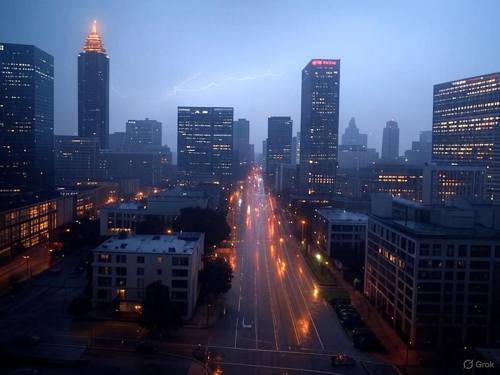
In its April 7, 2025, article titled Heavier rain is becoming more common in Atlanta, Axios Atlanta claims that “climate change is causing heavier downpours in Atlanta,” citing data supplied by Climate Central (CC). [emphasis, links added]
This attribution is false.
Evidence shows that localized urban factors—not global CO2 levels—are responsible for the modest increases in rainfall intensity in cities like Atlanta.
In their Axios article, writers Kristal Dixon and Alex Fitzpatrick parrot flawed conclusions previously debunked in a March 2025 analysis from Climate Realism titled Climate Central’s Misleading Urban Rainfall Claims Are All Wet.
Good reporters would have examined the evidence independently, rather than simply uncritically echoing CC’s claims.
As shown in that post, CC failed to examine the long-term historical context and rested their claims on cherry-picked data for the trends they identified.
When a more comprehensive dataset is examined, such as that compiled at Climate at a Glance, national U.S. precipitation patterns do not support the idea of a climate-driven rainfall crisis.
The U.S. Precipitation page makes clear: while some regional variability exists, no alarming or unprecedented surge in rainfall frequency or intensity is attributable to climate change.
The most glaring flaw that Axios inherits from CC is the complete omission of the Urban Heat Island (UHI) effect—a basic and long-documented phenomenon in which urban areas retain more heat than surrounding rural regions due to asphalt, concrete, and reduced vegetation.
This localized warming creates increased upward convection, providing the potential for increased storms in particular locations. Cities like Atlanta are textbook examples of UHI impact, as seen in the side-by-side images below.

Attributing localized effects to supposed human-caused global climate change while ignoring the critical role urbanization plays seems less of an oversight and more like deliberate misdirection in support of the “climate change causes everything bad” narrative.
Urban areas don’t just heat up differently—they also pollute differently.
Cities like Atlanta produce higher levels of particulate matter from vehicles, industrial activity, and heating systems. These particles serve as condensation nuclei, which facilitate cloud formation and rainfall.
A 2004 study published in Nature, “Enhanced precipitation due to aerosol effects”, documents this effect, showing how increased aerosols intensify rainfall in heavily polluted areas.
These findings have been corroborated in urban studies published by the American Meteorological Society, such as “Urban Influences on Cloud and Precipitation”, which demonstrate how cities create microclimates capable of amplifying rainfall—entirely independent of CO2-driven global climate change.
The rainfall trend that CC and Axios are attributing to “climate change” is more accurately explained by localized human impacts — not emissions from a coal plant in China or a car in Kansas, but heat-retaining surfaces and pollution within the very cities under discussion.
It’s disappointing but, sadly, unsurprising to see Axios uncritically report CC’s dubious climate change attribution for Atlanta’s recent rainfall trends as if it were a proven fact.
Climate Central continues to push a simplistic narrative that ignores fundamental atmospheric physics, misuses regional data, and omits well-established meteorological processes like UHI and aerosol-induced rainfall.
Until outlets like Axios start exercising at least a minimal amount of journalistic investigative curiosity and scrutinize claims made by climate activists that humans are causing changes to the weather, they’re complicit in spreading misinformation and misleading the public concerning the causes and consequences of climate change.
This isn’t science, it is narrative engineering in service to a sociopolitical agenda.
Read more at Climate Realism



















Also for the fact that back in the 1970’s it was Global Cooling and a New Ice Age was coming and also that Time and Newsweek was giving Top Coverage and episode of In Search Of back in 1978 was all about it
Yet another example of the dumb idea that climate change drives something or other, when, if there were to be actual climatic change, it would be some force driving the changes. In other words, this frequent claim is backwards from reality.